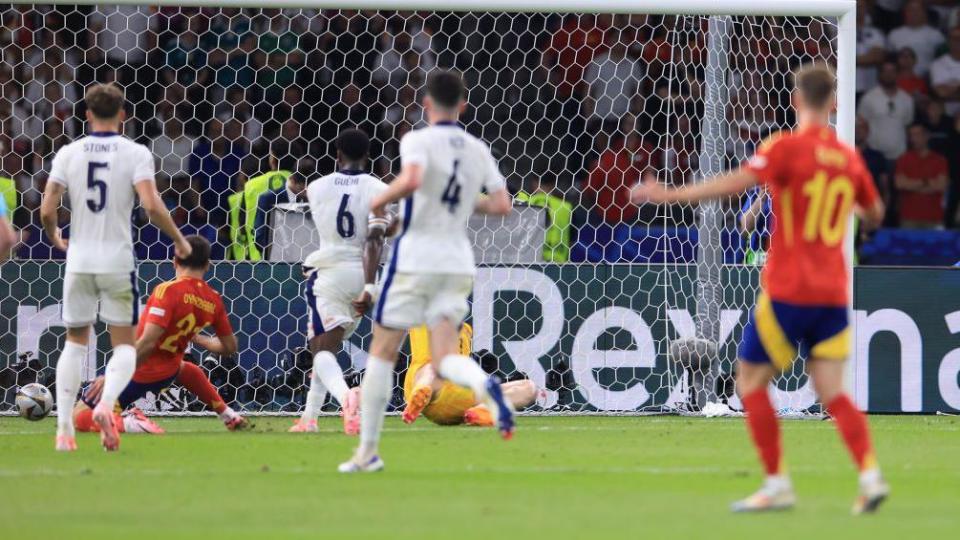


In the 54th minute of Nottingham Forest’s game at Liverpool on Saturday, Nuno Espirito Santo turned to his bench and sent on Callum Hudson-Odoi.
Eighteen minutes later, the substitute scored what proved to be the winner as Forest produced arguably the shock result of the season so far for their first win at Anfield since 1969.
Not only did Hudson-Odoi have an impact off the bench but also Anthony Elanga, who provided the assist.
“I didn’t start, but I wasn’t angry or disappointed,” Hudson-Odoi told Match of the Day after the game.
“In my head I just knew if I came on the pitch I’d have to make an impact and do what I can to help the team to win, which obviously I did.”
Hudson-Odoi was one of four substitutes to grab winning goals in the Premier League at the weekend and, while it is very early into the new season, statistics are showing that players coming off the bench are having more impact than ever before.
A ‘super-sub’ has been a fan favourite for years. Perhaps the most famous example is Ole Gunnar Solskjaer at Manchester United, who scored 28 goals from off the bench with many of them winners, the most famous of which being in the 1999 Champions League final.
Now more than ever they are affecting games.
In the 380 top-flight games last season there were 159 goals scored by substitutes – the most ever in the Premier League.
That figure was aided by the fact that more substitutes were also used than ever before, with a record eight on average per match.
We’re also seeing more late strikes than ever before with last season seeing more goals scored in the final five minutes of matches with 178.
Not all of those, of course, will have been scored by substitutes but the increase has coincided with managers now having the flexibility to make more changes than they could previously.
The obvious answer for this rise is the changes made to regulations around substitutes.
From the 2022-23 season, managers have been able to make five changes per game instead of three and that saw an increase in goals from substitutes from 102 in 2021-22 to 132 in the first under the new rules.
That increased by 27 goals in 2023-24 and the upward trend appears to be continuing this season, with 13.2% of goals scored in total so far coming from substitutes – a higher percentage than any other Premier League season.
But also having an impact is that matches have been lasting longer.
The average added time per game last season was 11 minutes and 36 seconds, almost double what it was just three years ago.
Again, more stoppages for substitutes is playing a part in that but the ball is also in play now for more minutes than ever before, with an average of 58:12 per game.
But this will likely change again this season, because of a change in timing goal celebrations.
Until now time was added on for every second between the ball hitting the net and the kick-off being taken.
Now the clock is only started after 30 seconds. So a game with six goals would have three minutes less of stoppage time.
There was a hint of irony in Nottingham Forest’s win at Liverpool in that it was the visitors’ substitutions who had an impact and not the hosts.
Reds boss Arne Slot made a triple change on the hour mark as Cody Gakpo, Darwin Nunez and Conor Bradley were sent on but 12 minutes later they were behind.
Last season, no team were more effective with their substitutes than Liverpool as they either scored or assisted 24 goals.
That was under Jurgen Klopp, who had a knack of making changes that swung game in Liverpool’s favour.
The German saw a total of 80 goals scored by substitutes in the Premier League – the fourth-most in history behind Arsene Wenger (148), Alex Ferguson (131) and David Moyes (96).
But interestingly is what you don’t see in the table above. Premier League champions Manchester City were ranked 11th for goal involvements from substitutes, who contributed 13 goals.
Pep Guardiola doesn’t usually tinker during games, instead more often than not putting his faith in the XI he started with. Last season he made on average 3.03 substitutions per game with only Roy Hodgson and David Moyes averaging fewer.


The impact of substitutes was also seen at this summer’s European Championship in Germany.
The tournament was the second Euros where five subs were permitted in regulation time and 11 of the 12 goals scored in added time at the end of matches were by players from off the bench.
Indeed the winning strike for Spain against England in the final was by substitute Mikel Oyarzabal, who was one of eight players overall who came on to score winners.
Now, more than ever, having the best squad rather than just the best starting XI is proving pivotal.